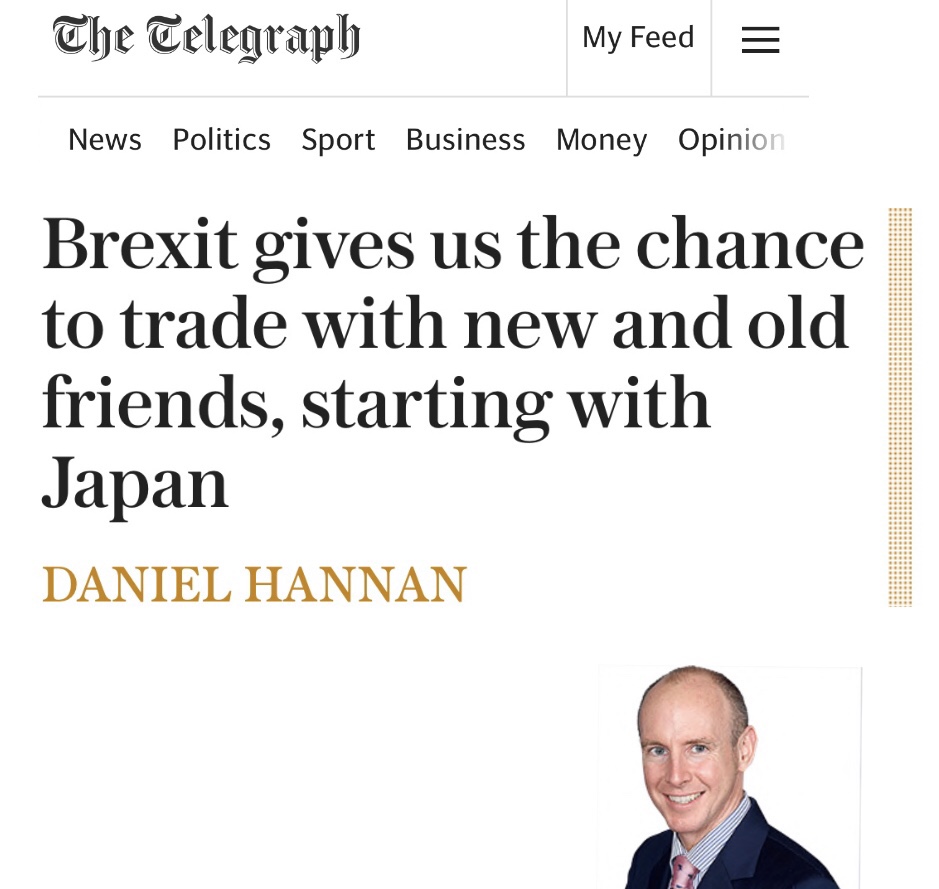Hannan: “Brexit gives us the chance to trade with new and old friends, starting with Japan”
Conservative MEP and journalist Daniel Hannan wrote an interesting article about Free Trade Agreements (FTAs) and a potential new FTA with Japan.
Even though some elements are not considered in the article, like agriculture, and the references to the Treasury calculations might be somewhat too strong – but I think the article is very interesting and bring a perspective on trade deals that is worth noting.

Here is the article:
Let’s remind ourselves why we are leaving the EU. The past three-and-a-half years have seen both sides entrench, like soldiers in the blasted mud of Flanders. Leavers accuse Remainers of betraying democracy. Remainers retort that the referendum was illegitimate, ill-informed and ill-gotten. Each side fires ordnance across no-man’s land, having all but forgotten why the conflict began.
Well, I haven’t forgotten. Brexit, for me, is about two things. First, democratic self-government: the supremacy of our own law. Second, global Britain: our ability to pursue our own foreign policy and trade deals without Brussels intermediaries.
The potential value of this second is illustrated in a paper by two international trade experts, Deborah Elms and Hosuk Lee-Makiyama, A Better Fit: Remodelling the EU-Japan EPA After Brexit, published yesterday [SAT] by the Initiative for Free Trade (of which, to declare my interest, I am President). Japan is the world’s third economy, and has traditionally seen Britain as its key partner. Around a thousand Japanese firms invest in the UK, employing, according to the Japanese government, 97,000 people.
Before we come to the benefits of a trade deal, it is worth noting that, of all the biased reports put out by Treasury Europhiles – all those duff predictions of rocketing unemployment and falling stock prices and housing collapses – the silliest has to do with trade. The Treasury solemnly claims that leaving the EU’s customs union would lower our GDP by 7.5 per cent whereas the gain of doing trade deals with the rest of the world would be equivalent to just 0.2 per cent of GDP.
What? What? The EU accounts for 44 per cent of our exports – a number falling by the week. So how can those two figures both be true? In order to come up with its numbers, the Treasury made a series of absurd assumptions: that Britain would impose tariffs on EU imports (we announced ages ago that we would do no such thing); that our trade deals with the US and others would be no more ambitious than what Brussels was proposing; that we would replicate, rather than improving, the deals with third countries that we inherited from the EU.
Why should we be so lacking in ambition? The EU-Japan deal, which entered into force this year, is limited in scope. EU negotiators were mindful of Continental agrarian and industrial interests, not British services. The authors of today’s report calculate that the total gain to the UK is less than 60 per cent of the average gain to the EU.
Happily, the Japanese government doesn’t want to “roll over” the existing EU deal with Britain. It aims higher, especially in investment, financial services and digital trade. Since these are precisely the areas where Britain stands to gain, we should grab the offer.
One of the saddest things about the past three years has been our timidity. Our civil servants approached Brexit in a spirit of damage-limitation. Our trade officials, for all that ministers claimed otherwise, assumed that we were staying in the EU’s customs union, even if under another name.
Things changed only when Boris arrived in Downing Street. Liz Truss, our dynamic new trade secretary, wants 80 per cent of our trade to be covered by FTAs within three years. We are exploring state-of-the-art agreements with allies like Japan, providing for mutual recognition in services, non-discrimination in investment, cross-border data flows and easier movement for service providers.
These things define modern trade. The arguments about agricultural standards and tariffs on manufactured goods, so important in Brussels, belong to a past century.
There is a strong case for prioritising Japan – along with Australia, New Zealand and Singapore. Britain should apply, in parallel, to join the Comprehensive and Progressive Trans-Pacific Partnership (CPTPP), which brings together those countries and seven other Pacific states.
True, we are not a Pacific nation (except in the technical sense of owning Pitcairn), but we have exceptional links with the region – not just to Australia, New Zealand and Canada, but to other common-law states such as Malaysia. The geographical determinism that lay behind the European project in the 1950s has been overtaken by technology.
These days, cultural proximity trumps physical proximity. We start from a position of unique regulatory inter-operability with several of the CPTPP members – although we have lately been dragged into the EU orbit on issues like digital commerce.
At the beginning of the twentieth century, Britain stood consciously aside from the European alliance system – a policy later known as “splendid isolation”. Our one alliance, after 1902, was with Japan, the mirror island monarchy at the other end of the Eurasian landmass. The thinking was that our interests could not clash – and, indeed, Japan loyally supported us through the Great War. Only later, as Japanese rivalries with the United States rose, did our treaty lapse.
Japan, like Britain, is an old country that looks across the oceans for its prosperity. We are natural partners. ‘Tis a consummation devoutly to be wished.
Source: Telegraph
You must be logged in to post a comment.